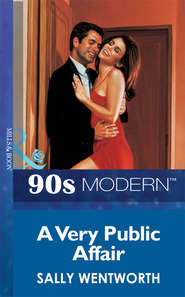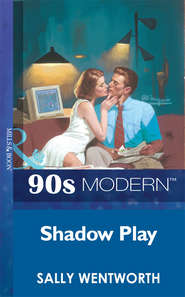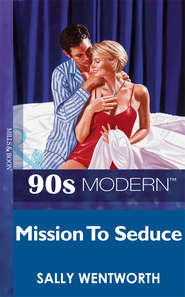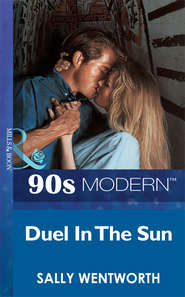По всем вопросам обращайтесь на: info@litportal.ru
(©) 2003-2024.
✖
Chris
Автор
Год написания книги
2018
Настройки чтения
Размер шрифта
Высота строк
Поля
‘But you looked very pretty in it.’
She smiled at him under her lashes, having got the answer she wanted from him. ‘Thank you.’ Resting her chin on her hand, she looked at him attentively and said, ‘Tell me; what is a quinta?’
She already knew, of course, but it was a good enough opening gambit.
‘A quinta is the Portuguese word for farm or estate. It’s where we grow the grape-vines for the port wine. I’m surprised you haven’t come across it before.’
‘But you see, my phrase-book only gives English to Portuguese; when it’s the other way round I’m stuck.’
Calum laughed. ‘I’ll have to find you a two-way dictionary. That’s if you’re going to be here for very long?’ He made it a question, which was a good sign.
‘I don’t have any immediate plans to leave. But you were telling me about your quinta; does it have a name?’
‘The company owns several in the Alto Douro—that’s the Upper Douro valley. Er—you do know that the river that runs through Oporto is the Rio Douro?’
‘Oh, yes, I do know that,’ she assured him with amusement in her eyes.
He nodded and gave a small smile. ‘Our principal vinegrowing estate is called the Quinta dos Colinas—the farm of the hills. That’s where we’re holding another bicentennial party, for all our workers and their families.’
‘Do you actually make the wine at the quinta?’
‘Yes, but by very modern methods. We no longer have workers treading the grapes to extract the juice.’
Tiffany’s nose wrinkled a little. ‘Why not?’
Reaching out, Calum tapped the end of her nose. ‘For the very reason that you just did that! No one would buy the wine if they thought it had been trodden by the great feet of peasant workers. People are too particular today; everything must be done by hygienic methods.’
There was a slightly disparaging note in his voice which Tiffany picked up and used as a cue to say, ‘I suppose so, but treading the grapes sounds much more romantic. Have you done it yourself?’
‘Yes, but many years ago now.’
‘Do you stand in a big tub to squash them? How high do they come up?’
‘Not a tub, a big stone trough or tank. And on most people the grapes would come up to their knees, but on you I think it would be a little higher,’ he remarked, looking at her legs.
‘How unkind of you to remind me.’
‘Do you dislike being short?’
‘It’s often a great disadvantage,’ she admitted.
‘I really can’t see why you should think so.’
It was a nice reply, a compliment without going overboard. Tiffany began to realise that Calum must be more experienced with women than she’d thought. His reputation in Oporto wasn’t that of a playboy—that title was reserved for Chris. From what she’d heard of him, Calum was the serious type, hard-working and rather reserved. He was also one of the most eligible bachelors in the town. Rich, very good-looking, well-bred—what girl could ask for more? And he was in his thirties—high time he went looking for a wife. But that wife would have to be fair, to carry on the Brodey tradition. Everyone knew that, so all the dark-haired girls, the brunettes and the redheads, sighed and left him alone, certain they would be wasting their time if they made a play for him. And there weren’t too many blondes in Portugal, which was why Tiffany had thought him inexperienced. But that, of course, was stupid: even if the girl he eventually married had to be a blonde, that didn’t stop him gaining experience with all the others.
He started to describe the first grape-treading he had been taken to, as a baby, still in his mother’s arms. ‘It’s a tradition, you see. It’s supposed to get wine-making into our blood.’
Behind them, Chris came out on to the terrace and overheard. Pulling out a chair, he turned it round to sit astride it, his arms along the back. ‘But all it did was to give us a taste for wine from an early age. At least, it did in my case.’
Annoyed that he’d interrupted her tête-à-tête with Calum, Tiffany hid it behind a smile. ‘I’m not surprised. But obviously it didn’t work with your father.’
Chris raised an eyebrow. ‘Who told you that?’
‘Someone at your party said he was an artist, that he wasn’t part of the family firm,’ she said quickly, inwardly cursing herself for making such a stupid slip.
Calum nodded. ‘That’s so, but he still appreciates a good wine.’
Chris gave her an amused look. ‘Who was it told you he was an artist?’ he asked, guessing her thoughts, wanting to needle her.
But Tiffany was a match for him. ‘Wasn’t it you?’ she said sweetly. A glint came into his eyes, but she turned quickly back to Calum. ‘Are you interested in art, Calum? I’m afraid I know very little about Portuguese painters but I went to an exhibition recently at the museum. Did you go to it?’
‘Yes. As a matter of fact our company was one of the organisers. A group has been formed to try to sponsor and encourage contemporary painters. Not that I agree with everything they do.’
‘You don’t like modern art?’
They got into a discussion on the subject, and she was on safe ground here because she really had been to the exhibition—when she’d read that Calum was one of the sponsors—and had also done a lot of reading since. She didn’t overstate it, but could see that Calum was impressed by her knowledge. It was hard, though, to keep up her end of the conversation when out of the corner of her eye she could see Chris watching her, a sardonic curl of amusement to his lip, knowing exactly what the score was.
It was almost a relief when Francesca came back to join them and the conversation became general. She sat in between Calum and Chris, and they began to swap family stories and information, talking about people Tiffany had never heard of. Tiffany got to her feet. ‘What time is dinner?’
‘Oh, dear, don’t let us drive you away, Tiffany. I’m sorry; it’s just that we haven’t seen each other for so long,’ Francesca said, putting up a hand to stop her. ‘We didn’t mean to bore you. Chris, why don’t you take Tiffany for a walk round the garden while I catch up on Calum’s news? I’ll get round to you later.’
‘Oh, no, please. I’d just as soon——’
‘But I insist,’ Chris broke in. ‘Francesca can tell me all her secrets later.’
‘What makes you think I have any secrets?’
Chris bent to kiss her cheek. ‘You always have—and until some man comes along who can tame you you always will.’
‘Hark at the man! A psychologist now,’ Francesca scoffed. ‘I’ll have you know I’ve decided to marry Michel.’
‘Congratulations. I’ll give it six months.’
‘Six months!’ Francesca exclaimed indignantly.
Chris gave her a contemplative look. ‘No, perhaps you’re right. Three months should have you bored to tears and walking out on him.’
Picking up a cushion, his cousin threw it at him, then pointedly turned her back. Chris chuckled and walked away, but Tiffany noticed that Francesca turned her head to look after him, a strange, desolate kind of look in her eyes.
Tiffany didn’t want to be alone with Chris, was afraid that he would taunt her again, and had already decided that as soon as they were out of sight of the others she would make an excuse and leave him. But when they reached the far end of the lawn he said, ‘I don’t think you’ve seen the rest of the garden, have you? Let’s go this way.’
‘Thanks, but I’d really like to have a bath and change before dinner.’
Tiffany went to turn away but he reached out and put a firm hand under her elbow. ‘There’s plenty of time yet. Come and see the fruit garden.’
His grip was firm and Tiffany knew he wasn’t about to let her go. She gave him an angry glare but had to go with him.
At the end of the ornamental garden there was what looked to be a very high, dense hedge sloping down the hill on which the house stood, but she was amazed to find that it was actually two hedges with a path that descended by flights of stairs between them. The hedges met overhead, giving a cool, shady walk, with occasional shafts of sunlight where there were openings into the garden. Stone seats were set into arbours and there were marble statues of wood-nymphs on plinths, the white stone standing out against the deep green of the hedges.











